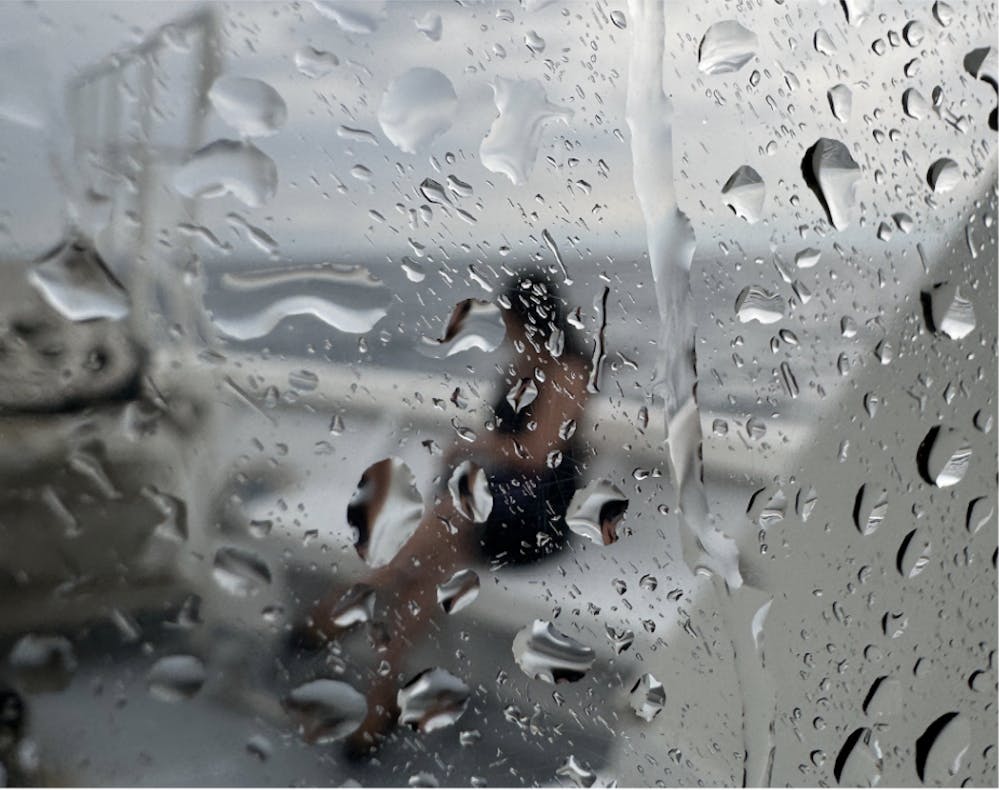
When the sky is pouring with a certain degree of violence, everything smells sharper. One explanation for this is logic: Other senses blur — the thunderous noise of a downpour muffles our hearing, water gathers in the way of vision, touch is overwhelmed beneath cold wet clothes; the sense of smell gains clarity. The muddy asphalt falls under a sudden, water-pressure cleanse. The dampened leaves on low-hanging branches take on a sharper smell. And there’s that clear, fresh scent of dirt. Another explanation: memory.
Nothing reminds me of home with quite so much fervor as a heavy thunderstorm. It’s the smell, yes, but it’s also the feeling of rain-soaked clothes against skin, the bite of water smattering my eyes.
Where I grew up, we have typhoon seasons – several months at the tail end of summer that run close to the year’s end. I remember days off in primary and middle school spent giddily indoors. In high school, I recall trudging through vicious downpours, walking sideways against the rain for afternoon classes (since older students, allegedly, deserved to brave mild to moderately dangerous typhoons). I’d walk through the downpour, blasting music through my (wired!) earphones, taking the opportunity to find a song that matched the pace of the rain just right, marveling at every moment thunder struck on beat. Under only the fiercest storms, I remember exams canceled last minute, the following succession of text notifications as otherwise inactive group chats erupted in celebration.
A fond memory from high school: I sleep through my alarm, wake in a panic to the sound of wind whistling. Taped to a surface right across my eye line is a note from my mom: Typhoon today, school canceled! The swelling joy that rushed through my chest so quickly it felt like I was going to burst. I still have the note.
Typhoons remind me of the cozy indoors. Since the sky was a dark, ominous gray all day, time ceased to matter. On some typhoon days, my mom and I took breakfast for lunch. We played loud music while the windows shuddered – bossa nova on lighter rains, eighties new wave under heavier showers. We cooked, baked or painted. Always, there was a good movie or two. Under those darkened skies, the entire day took on the calm of an early evening.
Much of Macao, the small peninsula where I grew up, overlooks the Pacific. From the height of our apartment, we could see the skyline over the ocean. On typhoon days, I watched that skyline disappear beneath the weight of dark, dense clouds. Rain, from a distance, was a smudge; rain, over us, poured until our entire view felt held within a waterfall.
Since I can remember, I’ve watched a thundering sky with awe. Typhoons always seemed so powerful. They forced everyone across the city into shelter, sending our lights flickering with blackout warnings. Typhoons plucked trees like cherries from a bunch, and even the most untouchable test dates could be rewritten by a good storm. Typhoons seemed, to me, like they could take everything away if they chose to. Yet, most often, they didn’t. There was something so beautiful about the might of an uncontrollable force that appeared to work with constraint.
Walking through typhoons, sudden gusts upturning my umbrella, every step taking five times the amount of effort it should, I felt small and insignificant — everything felt small and insignificant. The trees or the STOP sign, a dog, pigeon or myself could be picked up and thrown into the rain without a say. Ironically, this sense of overwhelming insignificance bestowed an incredible significance upon every little thing. The tree was no more significant than I was, than my exam was, than the rain itself was, but, when the rain made the storm — a force that could take down anything — even the smallest, most minuscule parts of the world had to hold greater meaning through their connection to the whole.
Whenever a storm is brewing, I begin to smell it: the wind of a downpour. It smells like clarity and overwhelming significance, like fresh dirt and streets swept clean. This smell, no matter where I am, reminds me of home.
Kaitlin Tan is a junior from Manila, Philippines majoring in Writing Seminars and Cognitive Science. She is a Magazine Editor for The News-Letter. In her column, she tries to parse through the everyday static for something to hold onto.





